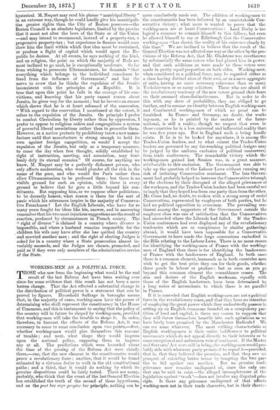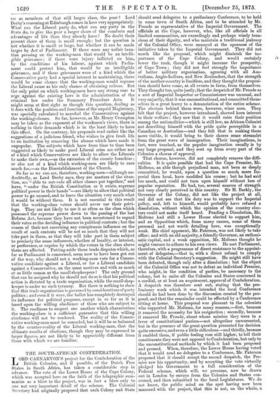WORKING-MEN AS A POLITICAL FORCE.
THOSE who saw from the beginning what would be the real 1 result of the last Reform Act have been waiting ever since tor some evidence that this result has not been a mere barren change. That the Act effected a substantial change in the distribution of political power is a statement that can be proved by figures. Household Suffrage in boroughs means that, in the majority of cases, working-men have the power of determining who shall represent the constituency in the House of Commons, and this is tantamount to saying that the policy of the country will in future be shaped by working-men, provided that working-men will take the trouble to shape it. In order, therefore, to forecast the effects of the Reform Act, it was necessary to come to some conclusion upon two points,—first, whether working-men would give themselves this amount of trouble ; and next, what shape they would impress upon the national policy, supposing, them to impress any at all. The predictions which were hazarded about the time of the passing of the Reform Act were chiefly three,—one, that the new element in the constituencies would prove a revolutionary force ; another, that it would be found animated by a virtuous desire to walk in the old constitutional paths ; and a third, that it would do nothing by which its genuine dispositions could be fairly tested. There are many, probably, who think that the event of the. last General Election has established the truth of the. second .of these hypotheses, and on the post hoc ergo propter hoc principle, nothing can be more conclusively made out. The addition of working-men to the constituencies has been followed by an unmistakable Con- servative victory ; what more is wanted to prove that the working-men are at heart Conservatives ? Lord Derby is too logical a reasoner to commit himself to this fallacy, but even he allowed himself to say at Edinburgh that the Conservative working-man "has shown the reality of his existence clearly by this time." We are inclined to believe that the result of the- General Election was not affected one way or the other by the pro- visions of the Reform Act, that Mr. Gladstone was overthrown by substantially the same voters who had placed him in power, and that such additions as were made to these voters were made in pretty equal proportion on both sides. Working-men, when considered as a political force, may be regarded either as a class having distinct aims of their own, or as a mere aggregate of units, having no more necessary coherence than so many Yoikshiremen or so many solicitors. Those who are afraid of the revolutionary tendency of the new voters ground- their fears on their assumed class-distinctiveness. But in order to do this with any show of probability, they are obliged to go further, and to assume an identity between English working-men and Continental working-men of which no proof can be furnished. In France and Germany, no doubt, the work- ing-man, as he is painted by the orators of the Inter- national, is still a reality, though we suspect that even in these countries he is a less universal and influential reality than he was five years ago. But in England such a being hardly exists. If he is to be looked for anywhere, it is among the Trades-Union leaders, and to what extent the Trades-Union leaders are governed by any far-reaching political designs may be judged by the uniform exclusion of political controversy from trade conferences. The remarkable victory which the working-men gained last Session was, in a great measure, attributable to this exclusion. The Government was able to take up the question of the Labour Laws without running any risk of irritating Conservative sentiment. The late Govern- ment had probably helped to increase the Conservative triumph at the elections by their disregard of the alleged grievances of the workmen, and the Trades-Union leaders had been careful not to imply that they hoped less from one party than from the other. Mr. Cross had, no doubt, to reckon with a strong array of social Conservatism, represented by employers of both parties, but he had no political opposition to overcome. The prevailing sen- timent among the supporters of the Government outside the employer class was one of satisfaction that the Conservatives had succeeded where the Liberals had failed. If the Trades- Union conferences had ever displayed any of the revolutionary tendencies which are so conspicuous in similar gatherings abroad, it would have been impossible for a Conservative Government to have made the large concessions embodied in the Bills relating to the Labour.Laws. There is no more reason for identifying the working-men of France with the working- men of England than there is for identifying the landowners of France with the landowners of England. In both cases there is a common element, inasmuch as in both countries men wish to get the best price they can for their goods, whether those goods be labour or produce ; but as soon as you go beyond this common element the resemblance ceases. The aim and desires of the English workman, equally with those of the English landowner, have been determined by a long series of antecedents to which there is no parallel in France.
If it is conceded that English working-men are not a political force in the revolutionary sense, and that they have no intention of employing the great power which they undoubtedly possess in setting up an English commune founded on a compulsory par- tition of land and capital, is there any reason to suppose that they will throw themselves heartily into such agitations as we have lately been promised by the Manchester Radicals I We can see none whatever. The most striking characteristic of English working-men is their entire indifference to political movements which do not appeal directly to their interests or to some exceptional and unforeseen vein of sentiment. If the Master and Servants' Act were still in being, the working-men would pro- bably side with whatever party promised to repeal it—provided, that is, that they believed the promise, and that they saw no prospect of extorting better terms by tempting the two par- ties to bid against one another. But no genuine trade grievance now remains undisposed of, since the only one that can be said to exist—the alleged incompleteness of the legislation against ' truck '—does not involve any disputed prin- ciple. Is there any grievance undisposed of that -affects working-men not in their trade character, but in their eharac-
ter as members of that still larger class, the poor ? Lord Derby's reasoning at Edinburgh comes in here very appropriately. What can the Liberal party do, what can any party in the State do, to give the poor a larger share of the comforts and advantages of life than they already have ? No doubt their present share of them is small enough; but the question is not whether it is small or large, but whether it can be made larger by Act of Parliament. If there were any unfair taxa- tion pressing on the working-man that would be an intelli- gible grievance ; if there were injury inflicted on him, by the conditions of his labour, against which Parlia- ment could protect him, that would be an intelligible grievance, and if these grievances were of a kind which the Conservative party had a special interest in maintaining, there would be some chance that the working-man would espouse the Liberal cause as his only chance of obtaining redress. But the only point on which working-men have any strong case to urge against the existing laws is the administration of the criminal law under the Summary Procedure Acts. It might seem at first sight as though this question, dealing as it does with the position and functions of the unpaid Magistracy, was specially calculated to marshal the Conservatives against the working-classes. So far, however, as Mr. Henry Crompton may be taken as the exponent of the workmen's views, there is nothing in their demands which is in the least likely to have this effect. On the contrary, his proposals read rather like the suggestions of a judicious friend, who wishes to give fresh life to an institution by removing the abuses which have made it unpopular. The subjects which have from time to time been suggested as likely to make good Liberal cries are either not of a kind which Conservatives are likely to allow the Liberals to make their own,—as the extension of the county franchise ; or else not of a kind which working-men are likely to care much for,—as the Disestablishment of the Church.
So far as we can see, therefore, working-men—although un- doubtedly, as Lord Derby says, they are masters of the situa- tion, are " able to out-vote all other classes put together," and have, " under the British Constitution as it exists, supreme political power in their hands "—are likely to allow that political power to go unused, and to leave the situation very much what it would be without them. It is not essential to this result that the working-class voters should never use their privi- lege. They are not likely to use it as often as the class which possessed the supreme power down to the passing of the last Reform Act, because they have not been accustomed to regard their votes as the deciding influence in political contests ; but the reason of their not exercising any conspicuous influence on the result of such contests will be not so much that they will not take part in them, as that they will take part in them subject to precisely the same influences, whether of locality, or interest, or preference, or caprice by which the voters in the class above them are affected. Putting aside those trade disputes which, so far as Parliament is concerned, seem now to have been got out of the way, why should not a working-man vote for a Conser- vative candidate against a Liberal, or for a Liberal candidate against a Conservative, on the same motives and with as much or as little reason as the small shopkeepers ? The only ground that can be assigned why he should not do so is that his political action is dictated by a trade organisation, while the small shop- keeper is under no such tyranny. But there is nothing to show that this trade organisation is governed by considerations of party politics ; and even if it were, the ballot has completely destroyed its influence for political purposes, except in so far as it is based upon the willing obedience of those who are subject to it. The readiness to suspect one another which characterises the working-class is a sufficient guarantee that this willing obedience will not be rendered. The reality of the Conser- vative working-man must be conceded, but it will be so balanced by the counter-reality of the Liberal working-man, that the ultimate results of elections, though they may be expressed in larger figures, are not likely to be appreciably different from those with which we are familiar.



































 Previous page
Previous page